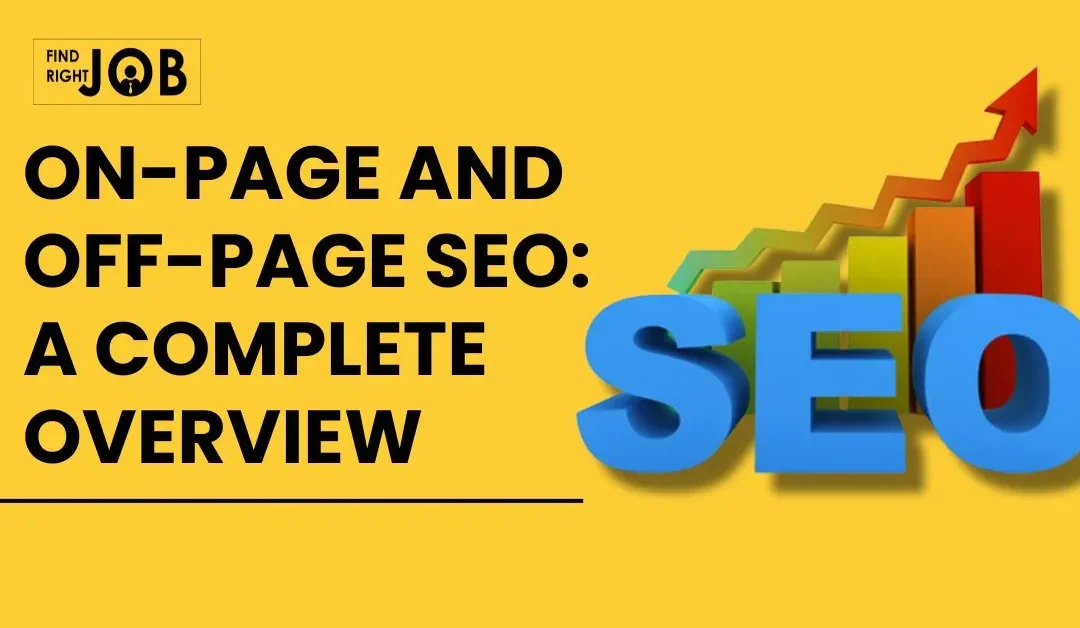In the current digital era, being found on search engines is a must for anyone who is hoping to be successful online. The two main parts of search engine optimization (SEO) that led to this contract are on-page and off-page SEO. Anyone thinking about a career in digital marketing has to understand these two foundations.
Key Elements of On-page Seo
Optimizing your website directly to raise its search engine ranks is known as “on-page SEO.” This includes the HTML source code that search engines use to index your website as well as the content you provide. Among the key parts of On-Page SEO are:
1. Content Quality: When it comes to On-Page SEO, content is king. Excellent, useful, and keeping material is given priority by search engines. This means offering users useful data and utilizing correct keywords naturally throughout your writing. And make sure your material matches their questions. To be important you must update your content often.
2. Keyword Optimization: It’s very important to choose suitable words and phrases. Some visitors enter these terms through search engines. Correct use of keywords can have a big impact on your rankings in headings, meta descriptions, content, and URLs. On the other hand, pushing content with too many keywords may result in penalties.
3. Meta Tags: As a part of on-page SEO, meta tags now make use of title tags and meta descriptions. There is room for a short description of your content in the meta descriptions; however, title tags describe the focus of the page to readers and search engines. It is possible to enhance click-through rates (CTR) for the search engine results page (SERP) with the help of good meta Tags.
4. URL Structure: A clear and informative URL structure can help in understanding of your page’s content by both users and search engines. To enhance SEO, URLs should be brief and contain suitable keywords.
5. Internal Linking: Including links to other pages on your website increases page authority and enables faster search engine crawling of your website. By helping customers explore similar material, it also encourages them to stay on your website longer.
6. Page Speed: Search engines prefer and offer a better user experience on pages that load quickly. Tools like Google PageSpeed Insights can assist find areas for improvement in page load speeds.
Key Elements of Off-Page SEO
Off-page SEO contains actions that improve your website’s authority and reputation online. On-page SEO works to improve your own website. Important elements of Off-Page SEO consist of:
1. Backlinks: The most necessary component of off-page optimization is backlink creation. Links that are obtained by some other sites and which point toward your website are known as backlinks. Search engines regard these backlinks as handshakes or votes of trust. It is said that the more the number of backlinking websites the more the quality level of the website is.
2. Social Media Marketing: Social networks serve as a useful tool in driving traffic to your website and should be used to complement your off-page search engine optimization activities. You can increase your online presence on social networks by communicating with your audience, creating posts, and seeking shares. Links from social media platforms boost brand awareness and can result in more backlinks, but they have no direct effect on SEO,
3. Guest Blogging: One effective strategy to increase backlinks and develop your reputation in your field is to write guest posts for other popular websites. Guest blogging gives you the chance to connect with new readers and offers backlinking chances.
4. Influencer Outreach: You may improve your Off-Page SEO by working with those who have power in your field. Influencers can spread the word about your content to their followers, which multiplies the number of backlink chances and builds trust in your company.
5. Online Listings and Directories: You may improve your Off-Page SEO by adding your website to internet directories and business listings. These listings may help local businesses rank up in key local searches and offer extra backlinks.
6. Brand Mentions: A brand on another website can help your Off-Page SEO even if the page does not connect directly to yours. Brand names can be identified by search engines and can indicate the quality of your website.
These are the must-know things about On-Page and Off-Page SEO.
Conclusion
For anyone looking for a career in digital marketing, learning both On-page and Off-page SEO is important. Together, these two SEO factors boost your website’s exposure, authority, and search engine score. You may optimize your website for success in the tough digital market by putting a lot of priority on high-quality content, intelligent keyword usage, useful backlinks, and sustaining a strong online presence. In the world of digital marketing, knowing and using On-Page and Off-Page SEO methods can greatly improve your capacity to attract visitors, interact with them, and see a steady increase

